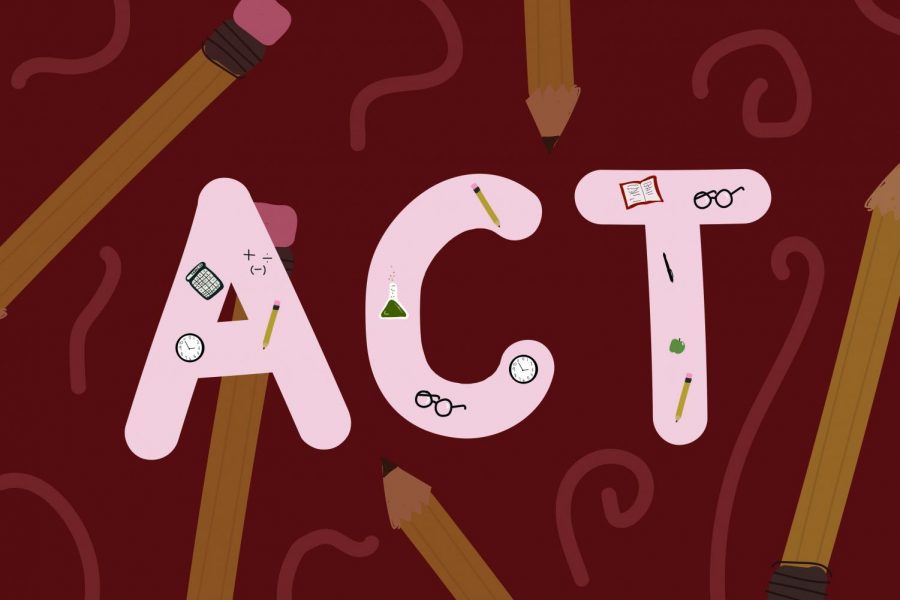In the height of college application season, seniors in particular are scrambling to compile their highest test scores to send to their dream schools. Not yet at this stage, juniors and even underclassmen are going from study groups to workbooks to tutors to prepare for the often dreaded ACT. Effective September 2020, ACT is switching things up in order to “provide new options designed to offer students more choices, faster results.”
The new update includes single section retesting, a choice between online and traditional testing, faster results with online testing and the ability to directly submit ACT super scores to colleges and universities. While many students are thrilled by these additions, current seniors are irritated that they are missing these options by just a year.
“I’m honestly pretty frustrated because I would say that the English and reading sections are easier for me than math and science because I’m a little bit challenged in math and science, so it was harder for me to just focus on math or just focus on science when I had to be focusing on all four,” senior Reagin Ward said. “If I could take math a different day or even at a different time, I would have more time to prepare and to focus so I could come with a fresh mind, especially since science is at the end. By then, I’m already burnt out.”
Like Ward, other test-takers understand the struggle of staying confident and alert from start to finish. Junior Anna Butler is grateful that she will be able to take advantage of these additions.
“I’m really happy about it because I’m a bad test taker, so when I get to the science portion of the test, it’s usually my lowest portion–not because I’m bad at science, but because my brain cannot do it anymore,” Butler said. “I’m really happy that I’m only a junior, and I have plenty of time to take subject tests.”
Though these updates may excite students because they are likely to help students raise their test scores, others are wary of how an increase in test scores will affect the college acceptance process.
“I think it’s going to present an opportunity for students to feel more confident, to test better, to improve their scores, but then you have to look at the fact that that’s across the board,” counselor and ACT site coordinator Jen Wibbenmeyer said. “So what ends up happening to colleges? If everyone has taken the subtests over and over again to get their best composite score, everyone is doing that, so it will make it very competitive at the college level. Everyone’s scores are going to improve, so how do you really make a distinction?”





![Smiling in a sea of Longhorns, Fox 2 reporter Ty Hawkins joins junior Darren Young during the morning Oct. 3 pep rally. The last time West was featured in this segment was 2011. “[I hope people see this and think] if you come to [Parkway] West, you will have the time of your life because there are so many fun activities to do that make it feel like you belong here. I was surprised so many people attended, but it was a lot of fun,” Young said.](https://pwestpathfinder.com/wp-content/uploads/2025/10/Edited2-1200x798.jpg)
![West High seniors and families listen as a representative of The Scholarship Foundation of St. Louis, Teresa Steinkamp, leads a Free Application for Federal Student Aid (FAFSA) workshop. This session, held in the library, provided guidance on financial aid, scholarships and student loan options. “This event is very beneficial for any seniors who are applying to or considering applying to colleges after high school [because] the cost of college is on the rise for seniors and parents,” college and career counselor Chris Lorenz said.](https://pwestpathfinder.com/wp-content/uploads/2025/09/DSC_4478-1200x778.jpg)
![Senior Kamori Berry walks across the field during halftime at the Homecoming football game on Sept. 12. During the pep assembly earlier that day, she was pronounced Homecoming Queen. “I thought it was nice that the crowd [started] cheering right away. I know [my friends] were really excited for me, and my family was happy because typically non-white people don't win,” Berry said.](https://pwestpathfinder.com/wp-content/uploads/2025/09/DSC7046-Enhanced-NR-1200x798.jpg)



![Pitching the ball on Apr. 14, senior Henry Wild and his team play against Belleville East. Wild was named scholar athlete of the year by St. Louis Post-Dispatch after maintaining a high cumulative GPA and staying involved with athletics for all of high school. “It’s an amazing honor. I feel very blessed to have the opportunity to represent my school [and] what [it] stands for,” Wild said.](https://pwestpathfinder.com/wp-content/uploads/2025/05/unnamed-6-1200x714.jpg)
![The Glory of Missouri award recipients stand with their certificates after finding out which virtue they were chosen to represent. When discovering their virtues, some recipients were met with contented confirmation, while others, complete surprise. “I was not at all surprised to get Truth. I discussed that with some of the other people who were getting the awards as well, and that came up as something I might get. Being in journalism, [Fellowship of Christian Athletes and] Speech and Debate, there's a culture of really caring about truth as a principle that I've tried to contribute to as well. I was very glad; [Truth] was a great one to get,” senior Will Gonsior said.](https://pwestpathfinder.com/wp-content/uploads/2025/04/Group-Glory-of-Missouri.jpg)

![After a thrilling point, senior Katie Byergo and junior Elle Lanferseick high-five each other on Oct. 8. With teamwork and camaraderie, Byergo worked together in the game against Lafayette High School. “[Byergo’s] is really positive with a good spirit,” Lanferseick said. “I set her [the ball] and she hits it [or] gets the kill.”](https://pwestpathfinder.com/wp-content/uploads/2025/10/DSC_9349-1-e1761159125735-1200x791.jpg)
![Focused on providing exceptional service, sophomore Darsh Mahapatra carefully cleans the door of a customer’s car. Mahapatra has always believed his customers deserve nothing less than the best. “[If] they’re trusting us with their car and our service, then I am convinced that they deserve our 100 percent effort and beyond,” Mahapatra said.](https://pwestpathfinder.com/wp-content/uploads/2025/10/DSC_0018-1200x800.jpg)
![Sophomore Aleix Pi de Cabanyes Navarro (left) finishes up a soccer game while junior Ava Muench (right) warms up for cross country practice. The two came to Parkway West High School as exchange students for the 2025-2026 school year. “The goal for the [exchange] program is to provide opportunities for both Parkway students and our international exchange students to learn about other cultures, build connections and become confident, capable, curious and caring — Parkway’s Four C’s — in the process,” Exchange Program Lead Lauren Farrelly said.](https://pwestpathfinder.com/wp-content/uploads/2025/10/Feature-Photo-1200x800.png)
![Leaning on the podium, superintendent Melissa Schneider speaks to Parkway journalism students during a press conference. Schneider joined Parkway in July after working in the Thompson School District in Colorado. “My plan [to bond with students] is to get things on my calendar as much as possible. For example, being in [classes] is very special to me. I am trying to be opportunistic [meeting] kids [and] being in [the school] buildings. I have all the sports schedules and the fine arts schedules on my calendar, so that when I'm available, I can get to them,” Schneider said.](https://pwestpathfinder.com/wp-content/uploads/2025/09/IMG_5425-1200x943.jpeg)
![Gazing across the stage, sophomore Alexis Monteleone performs in the school theater. The Monteleone family’s band “Monte and the Machine” has been releasing music since 2012, but Alexis started her own solo career in 2024 with the release of her first single, Crying Skies. “My whole family is very musical, [and I especially] love writing [songs with them],” Monteleone said.](https://pwestpathfinder.com/wp-content/uploads/2025/09/DSC7463-1200x798.jpg)
![Leaping through the air, senior Tyler Watts celebrates his first goal of the season, which put the Longhorns up 1-0 against the Lafayette Lancers. Watts decided to play soccer for West for his last year of high school and secured a spot on the varsity roster. “[Playing soccer for West] is something I had always dreamed of, but hadn’t really had a good opportunity to do until now. It’s [really] fun being out [on the field], and I’m glad I decided to join the team. It’s just all about having fun with the boys and enjoying what time we have left together,” Watts said.](https://pwestpathfinder.com/wp-content/uploads/2025/09/DSC_1951-1200x855.jpg)

![Shifting global trade, President Donald Trump’s tariffs are raising concerns about economic stability for the U.S. and other countries alike. “[The tariffs are] going to pose a distinct challenge to the U.S. economy and a challenge to the global economy on the whole because it's going to greatly upset who trades with who and where resources and products are going to come from,” social studies teacher Melvin Trotier said.](https://pwestpathfinder.com/wp-content/uploads/2025/05/MDB_3456-1200x800.jpg)
![Red, white and blue, the American flag holds the values of our democracy. The fight that we once endured has returned, as student journalists and senior correspondents across the country are losing their voices due to government control. “[Are] the White House and [the] government limiting free speech [and] freedom of the press? Yes [they are],” chief communications officer of the Parkway School District and former journalist Elisa Tomich said.](https://pwestpathfinder.com/wp-content/uploads/2025/03/Untitled-design-14.jpg)
![Freezing in their position, the Addams Family cast hits the “rigor mortis” pose after cast member and senior Jack Mullen, in character as Gomez Addams, calls out the stiff death move. For the past four months, the combined company of cast members, orchestra pit, crew and directors all worked to create the familial chemistry of the show. “I’m excited for [the audience] to see the numbers, the music, the scenes, but I also just love all the technical aspects of it. The whole spectacle, the costumes, makeup and the people that put in the work backstage in order to make the show successful on stage. I’m excited for people to see and appreciate that,” Mullen said.](https://pwestpathfinder.com/wp-content/uploads/2025/03/DSC0116-1200x800.jpg)

